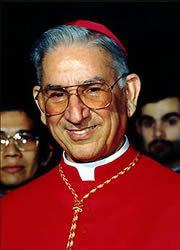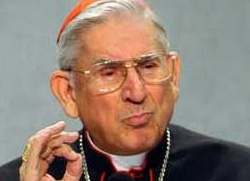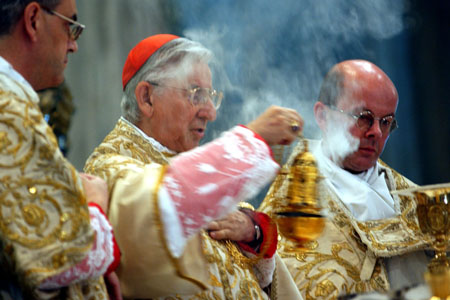by Vittoria Prisciandaro, JESUS
Found and translated by by Gregor Kollmorgen of the NEW LITURGICAL MOVEMENT
His Eminence is contented. The telephone of the ground floor office in the palace of the former Holy Office lives a new life. And on the desks correspondence from the entire world is piling up. After the promulgation of the Motu proprio, the Pontifical Commission Ecclesia Dei has in fact become an important part in the Vatican organization chart. “Now I have twice the work I had at the Congregation for the Clergy”, confides Cardinal Darío Castrillón Hoyos, a Colombian of 79 years, a fervent supporter of the return home of the Lefebvrians, and since 2000 President of the Commission. Born to maintain the relations with the Fraternity of St. Pius X and the groups gravitating in the traditionalist galaxy, “Ecclesia Dei” is today become an inevitable interlocutor of dioceses and parishes for the controversies concerning the application of the extraordinary rite.
Eminence, a few months after the promulgation of the Motu proprio, how do you take stock?
“With the Motu proprio the Pope wanted to give everyone a renewed opportunity to benefit from the enormous spiritual, religious and cultural richness present in the liturgy of the Gregorian rite [it appears the Cardinal is coining a term; he has used this repeatedly]. The Motu proprio emerges as a treasure offered to all, not in the first place to accommodate grievances and requests of anyone. Not a few of those who first were not involved in this extraordinary form of the Roman rite now manifest a great esteem for it. Among the faithful I would distinguish three groups: those who are linked in quasi organic form to the Fraternity of St. Pius X; those of the Fraternity of Saint Peter; and lastly the most important and numerous group, consisting of persons attached to the religious culture of all times, who today discover the spiritual intensity of the ancient rite, and among whom many young people. In these months have come into being new associations of persons belonging to this last group.”
Speaking of richness, some liturgists stress the fact that the extraordinary rite does not offer the biblical richness introduced by the novus ordo
“Those have not read the Motu proprio, because the Pope affirms that the two forms shall enrich each other. And it is evident that such a liturgical treasure is not being squandered. In the novus ordo with the years practically the entire Bible is read, and this is a richness which is not opposed to, but complementing the extraordinary rite.”
Another objection is about the danger that seperate and different celebrations can create seperate communities…
“It is a multiplicity which enriches, it is a wider cultural liberty which the Pope introduces in a bold form. Incidentally, in the parishes there are many differences in the celebrations, and I do not want to talk about the abuses, because the abuses are not the main reason of the Motu proprio.”
Your secretary, Monsignor Camille Perl, announced that shortly there will be a document clarifying the Motu proprio. When will it be released?
“It was Cardinal Bertone who announced it, and he has the right to do so. But I, who am a servant of the Pope, will only announce it when the Pope will say so. Our Commission has reported to the Pontiff that from all over the world so many questions come, very many justified, others due to lack of knowledge. The Holy Father, and he alone, will say whether it is convenient to issue such a document and when.”
What are the questions that have arrived and would deserve an answer?
“The first regards Latin, because – they say – to celebrate in a language which you do not know is not convenient. Unfortunately, the seminarians, but also some priests, have not studied it and therefore it is difficult for them to celebrate in the extraordinary form. To do so one should at least know the canon of the Mass, the part of the consecration. We in “Ecclesia Dei” are equipping ourselves and we are preparing meetings, courses and means of electronic communication for a deep knowledge of the earlier liturgy. Some courses are already being held in France, Germany, Brazil, Central America and the United States. At Toledo, Spain, for example, it is being evaluated whether it is convenient to erect a seminary specifically for the preparation for the extraordinary rite or to give special courses in the seminary of the diocese. In general we see an interest for the return of Latin in the academia. It was sad in these years to see the abandonment not only of the language, but also of certain theological content connected to the semantic precision of the Latin language.
Another problem is the shortage of priests …
“If in a diocese priests are lacking and only three or four faithful request the extraordinary rite, it is a thing of common sense to think that it is difficult to meet this demand. However, since it is the intention, the “mens”, of the Pope to grant this treasure for the good of the Church, where there are no priests the best thing would be to offer a celebration according to the extraordinary rite in one of the parish Sunday Masses. It would be a Mass for everyone, and everyone, including the younger generations would benefit from the richness of the extraordinary rite, for example, from those moments of contemplation that in the novus ordo have disappeared.
So you maintain that, even if there is no consistent and stable group, in the future it is intended to offer one of the Sunday Masses in the extraordinary rite?
“I think so. On the other hand, this possibility had already been approved unanimously in 1986 by a commission of cardinals in which was also present Cardinal Ratzinger, but then it did not become operative. Now I would be sure that it could be done.”
Another point to clarify is the definition of a “stable and consistent group”. What does it mean exactly?
“It is a matter of common sense: why make an issue if the people who ask for the rite come from different parishes? If they come together and request a Mass, they become a stable group, although they did not know each other before. Also the number is a question of goodwill. In some parishes, especially in the country, on weekdays the persons who come to the ordinary Mass are three or four, and the same happens in not a few religious houses. Why, if those same three people request the old Mass would it be pastorally necessary to reject it?”.
So the future document should be more welcoming of requests from few?
“Yes, but it has to be understood not as something that should be at the expense of others, of the majority, but for their enrichment and always avoiding any even minimal form of antagonism.”
Then there is the problem of the sacraments: I think of the rite of Ordination or the one of Confirmation, which refers to a different code of canon law and uses different formulas…
“Certainly at first sight there are some problems with regard to the sacred Orders, to Confirmation and also concerning the difference of the calendar. With regard to sacred Orders, in the ancient form there were the tonsure, the minor orders and the subdiaconate. This form is still in use and will continue to be so in the Institutes permanently attached to the ancient rite, as the Fraternity of Saint Peter, the Fraternity of Saint Pius X and other institutes. On Confirmation, even before the Motu proprio, the Congregation for the Doctrine of the Faith had already made it clear that there is no conflict between the two formulas, given that both the new formula and the old enjoy validity and the same is to be said for the other sacraments where the formula is different. With regard to the calendars that do not always coincide, there are actually problems as in the case of feasts of the patrons of a parish, of shrines, religious congregations and institutes, etc. With prudence and common sense the necessary arrangements will be made and with this also the Pontifical Commission “Ecclesia Dei” will deal.”
What time do you foresee for the reconciliation with the Fraternity of Saint Pius X?
“There are positive signs, there is an uninterrupted dialogue. A few days ago I wrote a new letter to Msgr Fellay, superior of the Fraternity, as a response to an earlier one of his. In addition to meetings and correspondence, we also hear each other on the telephone. I regard as viable the reconciliation with the fraternity Fraternity of Saint Pius X because, as we have often said at “Ecclesia Dei”, this is not a real schism but an anomalous situation which arose after the “schismatic action” of Msgr Lefebvre in conferring the episcopate without papal mandate, even against the express will of the Pope. In my heart I have great confidence that the Holy Father will be able to mend the fabric of the Church with the arrival of these brothers to full communion. Some differences will still remain, as we always had in the history of the Church”.
But with the Lefevbrians there is also a problem of acceptance of ecumenical dialogue…
“Yes, indeed there are difficulties with the interpretation of texts of the Council on this issue and with some concrete ecumenical practices, but no bishop of the Fraternity of St. Pius X will say that there is no need to seek the unity of the Christians.”
After the Motu proprio have some of the Fraternity St. Pius X come back to communion with the Church of Rome?
“Yes, and others have the will to do so. But I have the hope that the whole group comes, I would not want them to divide themselves. However, if an individual comes and says he wants to enter now into unity with the Pope, one must accept him. The Motu proprio did also draw other people near. For example, on March 28, I received a letter from a non-Catholic bishop, who has decided to enter the Catholic Church with other bishops and priests who celebrate the Tridentine Mass”.
Do the new powers of “Ecclesia Dei” not conflict with the ministry of the bishops?
“The Pope, who has the authority over the whole Church, over each of the faithful and the bishops, has set new norms in the Motu proprio, and the Pontifical Commission is only an instrument at the service of the Vicar of Christ, so that his decisions are being implemented. “Ecclesia Dei” takes care to apply the Motu proprio in fraternal harmony, understanding and collaboration with the bishops. Attitudes of antagonism with the shepherds must be avoided by persons, groups or institutions because of the Motu proprio. Certainly the shepherds, in obedience to the Pope, will have understanding for those faithful who have a special love for the liturgical tradition. With bishops who have contacted us, I always found understanding.”
In the introduction to the reprinting of the “Compendium of practical Liturgy” by Trimeloni [the Italian Fortescue], you write that the Pope avails himself of the Pontifical Commission “Ecclesia Dei” because in the diversity of the forms of cult there can shine the richness of the treasures of faith and spirituality of the Bride of Christ. In what consists the difference between the liturgy of John XXIII and the one reformed by Paul VI?
“Pope John has incorporated also the liturgy in his desire for dialogue of the Church with contemporary culture. Paul VI gave organicity to the reforms born of this desire. The Holy Spirit, which always accompanies the Church, inspires the necessary changes in every moment of history, without violent rupture of the process of perfection which He Himself has inspired in the course of history. Benedict XVI, with this motu proprio, makes common the riches of the two phases of the process, healing even so, the anxiety of those who believed that in matters liturgical there had been an unacceptable rupture.”
After the reformulation of the Good Friday prayer it was said that it was a returning 40 years back in Christian-Jewish dialogue. Had these criticisms been expected?
“Is it not a good thing to pray for our brothers the sons of Abraham? Abraham is the father of faith, but in a chain of salvation in which the Messiah is expected. And the Messiah has arrived. In the Acts of the Apostles we read that, in one day, five thousand Jews have converted. I am not contesting the prayer of the novus ordo, but I consider perfect the present one of the extraordinary rite. And I pray gladly for the conversion of my many Jewish friends, because I believe truly that Jesus is the Son of God and the Saviour of all”.
fonte:una voce carmel

 inundado por um mistério de luz que é Deus e N´Ele vi e ouvi -A ponta da lança como chama que se desprende, toca o eixo da terra, – Ela estremece: montanhas, cidades, vilas e aldeias com os seus moradores são sepultados. - O mar, os rios e as nuvens saem dos seus limites, transbordam, inundam e arrastam consigo num redemoinho, moradias e gente em número que não se pode contar , é a purificação do mundo pelo pecado em que se mergulha. - O ódio, a ambição provocam a guerra destruidora! - Depois senti no palpitar acelerado do coração e no meu espírito o eco duma voz suave que dizia: – No tempo, uma só Fé, um só Batismo, uma só Igreja, Santa, Católica, Apostólica: - Na eternidade, o Céu!
inundado por um mistério de luz que é Deus e N´Ele vi e ouvi -A ponta da lança como chama que se desprende, toca o eixo da terra, – Ela estremece: montanhas, cidades, vilas e aldeias com os seus moradores são sepultados. - O mar, os rios e as nuvens saem dos seus limites, transbordam, inundam e arrastam consigo num redemoinho, moradias e gente em número que não se pode contar , é a purificação do mundo pelo pecado em que se mergulha. - O ódio, a ambição provocam a guerra destruidora! - Depois senti no palpitar acelerado do coração e no meu espírito o eco duma voz suave que dizia: – No tempo, uma só Fé, um só Batismo, uma só Igreja, Santa, Católica, Apostólica: - Na eternidade, o Céu! 

